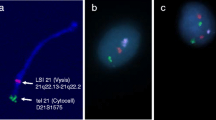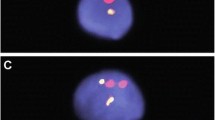Abstract
Paternal nondisjunction accounts for approximately 5% of cases of trisomy 21. To test the hypothesis that, in some such cases, the fathers might be predisposed to meiotic nondisjunction, we utilized fluorescence in situ hybridization (FISH) to screen for aneuploidy in sperm. We analyzed sperm samples from ten males with a trisomy 21 offspring of paternal origin. Among these individuals, the overall frequency of disomy 21 was 0.15%, comparable to estimates of disomy 21 in the general male population. Furthermore, none of the ten fathers of trisomy 21 individuals had significantly elevated levels of disomic sperm. Thus, our results provide no evidence that the occurrence of a trisomy 21 conceptus of paternal origin imparts an increased risk of trisomy in subsequent pregnancies.
Similar content being viewed by others
Author information
Authors and Affiliations
Additional information
Received: 9 September 1998 / Accepted: 30 September 1998
Rights and permissions
About this article
Cite this article
Hixon, M., Millie, E., Judis, L. et al. FISH studies of the sperm of fathers of paternally derived cases of trisomy 21: no evidence for an increase in aneuploidy. Hum Genet 103, 654–657 (1998). https://doi.org/10.1007/s004390050886
Issue Date:
DOI: https://doi.org/10.1007/s004390050886




